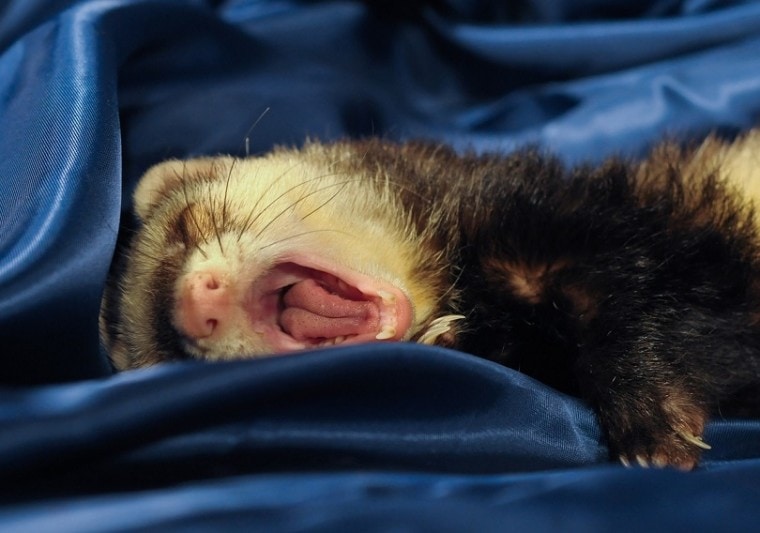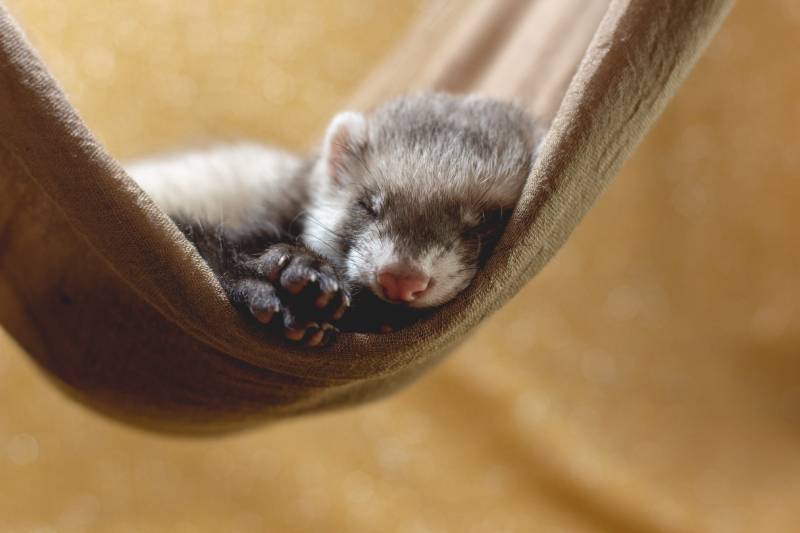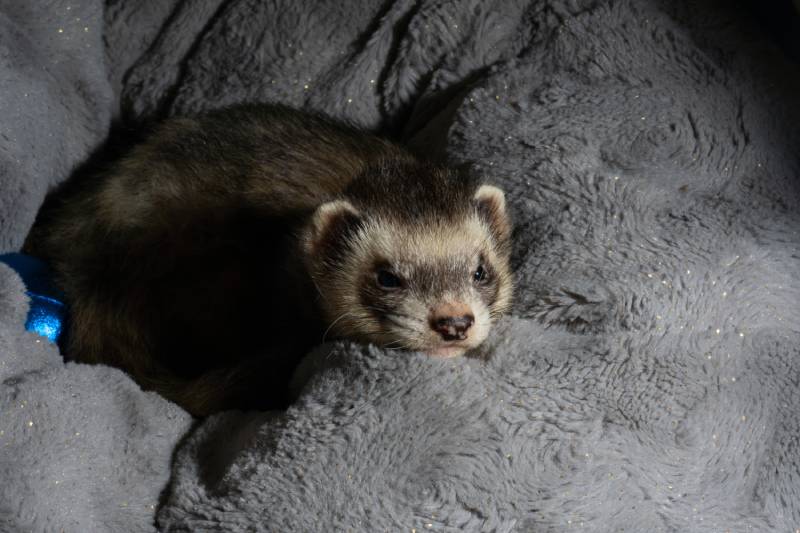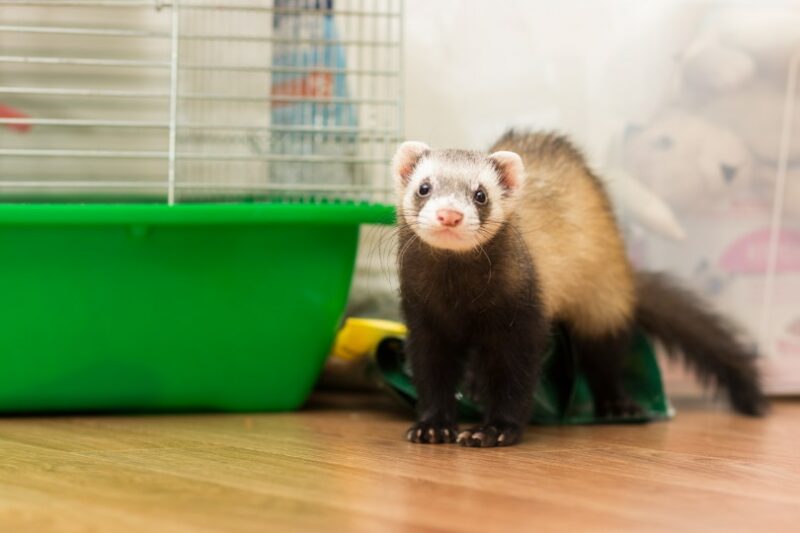
Ferrets are exceptionally playful and active. Anyone who owns a ferret will tell you that they seem to be constantly on the go. They often seem to spend little time relaxing and most of their time terrorizing their owner’s feet.
However, these tiny predators do spend most of the day sleeping. The average ferret will sleep for 14 to 16 hours a day.
When they are asleep, they are entirely out of it. When they are awake, they are entirely awake. There doesn’t seem to be a middle-ground for these animals. They’re either passed out in a corner or running around the house.
When Do Ferrets Sleep?

Ferrets are considered crepuscular, which means that they are most active during the twilight periods. This includes early in the morning around dawn and in the evening when the sun is setting.
Many predators fall into this category. For instance, lions tend to be most active during dusk and dawn too.
In the wild, it’s during this period that prey animals are most vulnerable. Many of them are out and about, trying to graze before it gets too dark or too hot. Rabbits are commonly out during this time, and these large rodents are usually a primary food source for wild ferrets. Even though pet ferrets aren’t hunting rabbits, they act like they are. Expect to be woken up early in the morning!
If you work during the day, you probably won’t see your ferret sleeping for much of the day. Still, ensure that you are home before dusk so you can let them out of their cage to play.
Since ferrets require quite a bit of exercise, it is essential to release them from their cage when they are awake. Otherwise, they might not get the exercise that they need, making them prone to health problems and acting even more hyperactive.
This sleeping schedule works out well for those who work routine 9-to-5 jobs. You can let your ferret out in the mornings and the evenings. When you’re at work, your ferret will be spending most of their time sleeping.
How Long Do Ferrets Sleep at Night?

Assuming that they break up their sleep cycle evenly, ferrets will sleep between 7 and 8 hours at night. They should also sleep this amount during the day. This may be done in one long stretch or as a few long naps.
However, not all ferrets will split their cycle up evenly. Some may sleep 10 hours at night and then 6 hours during the day. Others may sleep 6 hours at night and 10 hours during the day. Some ferrets may sleep even more than this!
Just like people, ferrets won’t all have the same sleep schedule. Many will adapt somewhat to your schedule, though. If you’re more active in the evenings, they probably will be as well. If you tend to stay up later, your ferret may adapt.
Early risers may find that their ferrets get up earlier in anticipation.
If you own multiple ferrets, they will likely line up their schedules somewhat and sleep about the same amount each night. However, there will always be a bit of variation.
Why Is My Ferret Sleeping So Much?

Ferrets sleep for 16 hours a day usually. Some ferrets may be sleepier and sleep for longer. There is a natural variation among ferrets, just like there is with people.
It isn’t wholly unusual to have a ferret that sleeps more than the recommended 16 hours. Some may sleep for 17 or 18 and be perfectly fine. That’s just how they are!
However, if your ferret seems to suddenly be sleeping more than usual, it may be a sign of an underlying problem. You should know your ferret’s usual sleeping pattern so you can detect significant changes in your ferret’s sleep.
Dilated Cardiomyopathy
Many medical conditions may lead to increased sleep. Dilated cardiomyopathy is one such disease. This occurs when the ferret does not intake enough taurine, an essential vitamin for heart health. Without it, your ferret’s heart will eventually stop working correctly. Signs include things like weakness, lethargy, coughing, and breathing quickly. Medications are available for this disease and dietary corrections may help.
Insulinoma
Ferret insulinoma causes a ferret’s blood sugar to spike uncontrollably and then drop suddenly. The pancreas becomes overactive. When a ferret’s blood sugar drops, they will likely become tired. This can cause excess sleeping. If it drops too low, coma and even death can occur. Excess sleepiness is a common sign. Medication of some sort is usually prescribed, but surgery may be recommended for some ferrets.
Aplastic Anemia
Ferret aplastic anemia sometimes occurs when a female goes into heat. They will produce large amounts of estrogen, which can cause bone marrow to become suppressed and stop making as many red blood cells. This will cause the ferret to become anemic. Signs of anemia include lethargy and weakness, which can often lead to increased sleepiness. This condition is treatable and spayed ferrets will not get it.
What Do Ferrets Like to Sleep In?

There are many ways that you can help your ferret get enough sleep. Ensuring that they have an appropriate bed is one of these ways.
It is best to provide your ferret with an enclosed, dark sleeping area. They sleep in burrows in the wild, usually those left by prey animals that they have eaten. Therefore, you want to recreate a burrow for your ferret to sleep in.
You can purchase commercial ferret tents that are designed for this purpose. However, many ferrets will do perfectly fine with a T-shirt, towels, blankets, pillowcases, and similar items. They will “dig” in their bed and bury themselves, so a pile of blankets or a lightly stuffed pillowcase often works well.
Different ferrets like different sleep setups. You may want to give your ferret many different sleeping options so they can decide which ones they like best. If their cage allows, try to provide at least two different beds.
The sleeping area should be dark and enclosed, as this will allow your ferret to get the maximum amount of sleep. After all, the inside of the burrows is always dark, even in the middle of the day.
Furthermore, ferrets suddenly exposed to extra light will think that it is springtime, which means mating time. Some ferrets will start producing extra hormones if their darkened sleeping area is taken away.
Ferrets typically don’t like light at night, so we recommend covering their cage after bedtime. This will also prevent them from waking up too early. Draw the curtains in the room that they are in as well, especially if you’re planning on sleeping in.
Final Thoughts
Ferrets may be characterized as highly active, but they are also sleepy pets. They will spend most of their time sleeping. Most will spend about 14 to 16 hours per day sleeping, though some will spend more or less.
You can expect natural variation between ferrets. Just like people, no two ferrets are precisely alike. Some will sleep far more than others.
However, you should take note of any sudden changes in your ferret’s sleeping patterns. Often, this can indicate an underlying medical condition. Many conditions can make your ferret sleepier than usual. Many of these can be treated, though, so it is vital to recognize the signs and take your ferret to the vet right away.
Either way, you can likely expect your ferret to sleep more than they are awake. If your ferret seems to be having difficulty sleeping, make sure they have an appropriate sleeping place. Ferrets like it dark when they sleep, even during the day. A ferret tent or burrow can provide a comfortable spot for them to rest.
Featured Image Credit: christels, Pixabay







